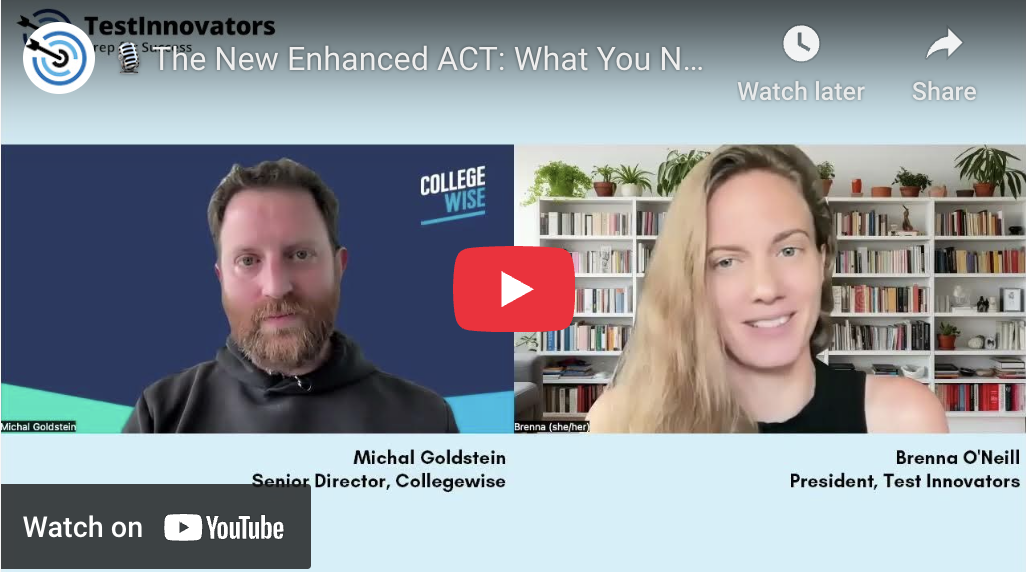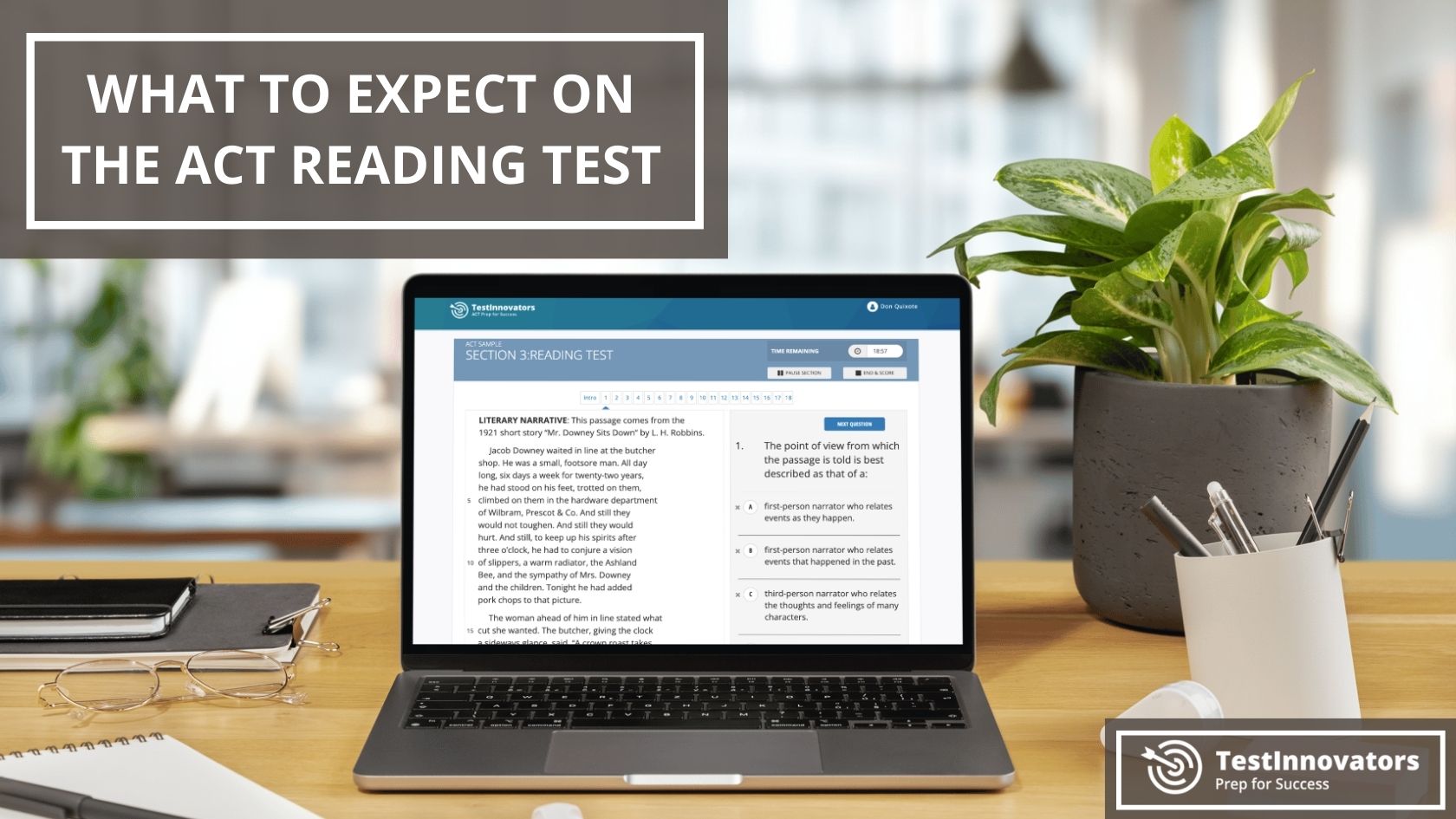Podcast: What You Need to Know About Enhanced ACT with Collegewise’s Michal Goldstein
Sara Laszlo2025-08-20T10:42:04-07:00The ACT is undergoing its biggest update in decades. To help students and parents understand what’s changing — and how to prepare — Test Innovators’ President Brenna O’Neill sat down with Michal Goldstein, Senior Director of the Collegewise Tutoring Team. Michal is a veteran test prep educator with more than 15 years of experience teaching the ACT, SAT, and other standardized tests.
In this podcast, Brenna and Michal discuss:
- How the test has changed (and how it’s stayed the same)
- How the changes affect scoring and timing
- Test-taking tips to approach the test strategically
- A deep dive into each section
- How to decide between the ACT and SAT
Below is a recap of their conversation. Check out the full episode for more details.
What Is the Enhanced ACT?
In late 2024, ACT, Inc. announced it would overhaul its signature test for the first time in decades. The enhanced ACT made its debut in April 2025 and will become the standard for all non-school-day testing in September 2025.
Michal explained that while the surface changes (shorter test, more time per question, etc.) sound simple, the real shifts happen “under the hood” in how questions are scored and how unscored questions are integrated.
Important Points to Know
- Shorter test: fewer questions and minutes in every section
- More time per question: reduced pacing pressure, especially in reading
- Optional science section: no longer part of the composite score
- Embedded field test questions: unscored questions appear within each section
Field Test Questions
The ACT has always included unscored questions, known as field test or experimental questions. These questions are used to try out new content for future exams and to gather data on how students perform on them.
In the past, all of the unscored questions were grouped into a separate fifth section at the end of the test. Students knew that section didn’t count toward their score, so many rushed through it or guessed at answers, which meant ACT wasn’t getting reliable data on these questions.
One of the biggest behind-the-scenes changes in the enhanced ACT is that these unscored questions are now embedded within the scored sections.
Key facts about field test questions on the enhanced ACT:
- One entire English passage won’t count toward your score
- Four math questions won’t count toward your score
- One entire reading passage won’t count toward your score
- One entire science passage won’t count toward your score
- On the passage-based sections, the first and last passages will not be part of the field test (Design Framework for the ACT Enhancements, page 27)
- The passage-based sections are English, reading, and science
Why it matters: With fewer total scored questions, each one carries more weight. Missing just a few scored questions can have a bigger impact on your overall score than in the past. Furthermore, knowing that one of the middle passages isn’t scored can have a big impact on your time management strategy in the passage-based sections.
Advice from Michal:
“Do the first passage first and then skip straight to the last passage and do that one second.”
Changes to the Enhanced ACT by Section
English
The enhanced ACT English section is shorter, with fewer total questions but slightly more time per question. Two of the passages are a little shorter than before, and each question now has a clear directive, but otherwise the format is pretty much the same. The skills tested (grammar, punctuation, usage, and rhetorical skills) remain the same, but the pacing is more forgiving.
Key changes to know:
- Fewer total questions and passages
- Two passages are slightly shorter than in the legacy test
- More time per question
- Every question includes a clear directive
- The field-test (unscored) passage will never appear first or last in the section. This means the first and last passages are always scored. A good strategy is to start with the first one, jump ahead to the last one, and then finish with the middle ones.
Math
The enhanced ACT Math section has fewer total questions and more time per question, giving students a bit more breathing room. The content areas are the same as before (algebra, geometry, trigonometry, and statistics). Questions are still organized in roughly the same order of difficulty, with the easiest questions at the beginning of the section and the hardest questions at the end.
Key changes to know:
- Fewer total questions
- More time per question
- Four questions will be field test questions and will not count toward your score
Reading
The enhanced ACT Reading section still has four passages, each followed by a set of questions. The skills tested and overall format are the same as before, but students now have more time per question.
Key changes to know:
- More time per question
- The field-test (unscored) passage will never appear first or last in the section. This means the first and last passages are always scored. A good strategy is to start with the first one, jump ahead to the last one, and then finish with the middle ones.
Science (Optional)
The enhanced ACT Science section is now optional and no longer counts toward the composite score. However, some colleges or programs may still want to see it, and students taking the test for state- or district-level requirements may still be required to complete it. As we’re waiting to see how colleges respond to the optional science section in this first year, Michal recommends taking it at least once.
Key changes to know:
- Optional for most students
- It’s no longer part of the composite score
- The field-test (unscored) passage will never appear first or last in the section. This means the first and last passages are always scored. A good strategy is to start with the first one, jump ahead to the last one, and then finish with the middle ones.
Advice from Michal:
“Take the ACT with Science at least once, just to get those scores under your belt…Most universities haven’t actually stated very clearly whether they want the ACT science or not, and as a function of that, they may actually have policies or admissions requirements that are going to evolve or change over the course of the next year, and you just want to make sure that you take the ACT in the most ideal fashion.”
Should I take the ACT on paper or on the computer?
Students can choose to take the ACT on paper or on a computer. It’s the same test (the content, format, and scoring are identical), but the test-day experience can feel very different.
Here are a few things to consider as you decide which version to take:
Digital pros:
- Touchscreen navigation
- On-screen calculator
- Ability to move ahead early if you finish a section
Digital cons:
- Potential for technical issues
- On-screen annotation can be clunky
Paper pros:
- Easier to annotate directly on the page
- No risk of tech disruptions
Paper cons:
- Must wait for section time to end before moving on
- Risk of misbubbling the answer sheet if you don’t answer the questions in order
No matter which version you choose, practice in the same format you’ll use on test day.
Should I take the ACT or the SAT?
With the enhanced ACT rolling out, some students are wondering if they should stick with the ACT or consider switching to the SAT. Both tests are accepted by U.S. colleges, but they have different structures, pacing, and question styles. The best choice depends on which test better matches your strengths and test-taking style.
Michal emphasizes that, despite the ACT’s updates, the decision-making process hasn’t changed much: “The classic advice to take a practice SAT, take a practice ACT, see how both shake out and then basically make a data- informed decision from there still applies here.”
Watch the Full Podcast Episode
Watch the full conversation to get more strategies and insights into the new enhanced ACT.

Michal Goldstein
Senior Director of Tutoring & Testing, Collegewise
Michal has over 15 years of experience in test preparation and leads the tutoring team at Collegewise. He has worked with thousands of students on the ACT, SAT, GRE, and GMAT, helping them build confidence and achieve their goals. Based in Austin, Texas, Michal takes each test he tutors every year to stay current with the content and student experience.

Brenna O'Neill
President, Test Innovators
With a background as a high school math and English teacher and nearly a decade at Test Innovators, Brenna brings deep experience in education, assessment, and program design. She oversees the creation of tools and resources that support students in diverse learning environments—partnering with access organizations, schools, and families—to help all students reach their academic goals.









